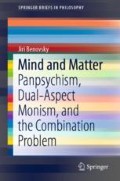Abstract
Any plausible solution to the mind-body problem needs to account for subjectivity. In this chapter, I discuss and use a notion of ‘mineness’, and I compare it to related neighbouring notions. We thus realize that we can have an account of subjectivity in terms of a first-order aspect of experiences, and I show how such a view nicely combines with dual-aspect monism.
Access this chapter
Tax calculation will be finalised at checkout
Purchases are for personal use only
Notes
- 1.
This parallels what Zahavi says about the self (i.e. his very minimal notion of the self, which is not, in his view, an independent subject but the subjectivity of experience); he says “Nor is [the self] given as an additional experiential object or as an extra experiential ingredient, as if there were a distinct self-quale, next to and in addition to the quale of the smell of burnt hay and roasted almonds” (Zahavi forthcoming).
- 2.
- 3.
We could be tempted to say “qualitative”, but remember that they are not qualia.
- 4.
- 5.
- 6.
Brentano (1874, pp. 153–154).
- 7.
Kriegel (2009, p. 1 and 2).
- 8.
Lewis (1986, p. 145).
- 9.
Philosophical theories rely heavily on their primitives to do the job they do. I discuss in detail the role of primitives in philosophical theories in Benovsky (2016, especially Chap. 4).
References
Armstrong DM (1968) A materialist theory of the mind. Routledge, London
Armstrong DM (1984) Consciousness and causality. In: Armstrong DM, Malcolm N (eds) Consciousness and causality. Blackwell, Oxford, pp 103–191
Benovsky J (2013) The present vs. the specious present. Rev Philos Psychol 4(2):193–203
Benovsky J (2016) Meta-metaphysics. Springer
Brentano F (1874) Psychology from an empirical standpoint. In: Rancurello AC, Terrell DB, McAlister LL (eds). Routledge, 1973
Broad CD (1923) Scientific thought. Harcourt, Brace and Co, New York
Dainton B (2000) Stream of consciousness. Routledge, London
Dainton B (2003) Time in experience: reply to Gallagher. Psyche 9(10)
Gennaro R (1996) Consciousness and self-consciousness: a defense of the higher-order thought theory of consciousness. John Benjamins Publishing Company, Amsterdam, Philadelphia
Gennaro R (2005) The HOT theory of consciousness: between a rock and a hard place. J Conscious Stud 12(2):3–21
Guillot M (2016) I me mine: on a confusion concerning the subjective character of experience. Rev Philos Psychol:1–31
Hoerl C (2009) Time and tense in perceptual experience. Philos Impr 9(12)
Howell RJ, Thompson B (2017) Phenomenally mine: in search of the subjective character of consciousness. Rev Philos Psychol 8(1):103–127
Howell RJ (manuscript) The self and the objective perspective, presented at the Ovronnaz ‘self and subjectivity’ workshop, march 2018
Hume D (1738/1978) A treatise of human nature. In: Selby-Bigge LA (ed) revised by Nidditch PH. Oxford University Press, Oxford
Husserl E (1964) The phenomenology of internal time-consciousness. In: Heidegger M (ed) Churchill JS (trans.). Bloomington: Indiana University Press
James W (1890) The principles of psychology. H. Holt and company, New York
Kriegel U (2003) Consciousness as intransitive self-consciousness: two views and an argument. Can J Philos 33(1):103–132
Kriegel U (2009) Subjective consciousness: a self-representational theory. Oxford University Press
Levine J (2001) Purple haze: the puzzle of consciousness. Oxford University Press
Lewis D (1976a) Survival and identity. In: Rorty AO (ed) The identities of persons. University of California Press, pp. 17–40
Lewis D (1976b) The paradoxes of time travel. Am Philos Q 13(2):145–152
Lewis D (1986) On the plurality of worlds. Blackwell Publishers
Lycan WG (1996) Consciousness and experience. MIT Press, Cambridge, MA
Lycan WG (2001) A simple argument for a higher-order representation theory of consciousness. Analysis 61:3–4
Parfit D (1984) Reasons and persons. Oxford University Press
Phillips I (2011) Indiscriminability and experience of change. The Philosophical Quarterly
Rosenthal D (1986) Two concepts of consciousness. Philos Stud 49:329–359
Rosenthal D (2002) Explaining consciousness. In: Chalmers D (ed) Philosophy of mind: classical and contemporary readings. Oxford University Press, pp. 406–421
Sartre JP (1943) L’être Et le Néant. Gallimard, Essai d’Ontologie Phénoménologique
Zahavi D (2005) Subjectivity and selfhood: investigating the first-person perspective. Bradford Book/MIT Press, Cambridge, MA
Zahavi D (forthcoming) Consciousness and (minimal) selfhood: getting clearer on for meness and mineness. In: Kriegel U (ed) The Oxford handbook of the philosophy of consciousness. Oxford University Press
Author information
Authors and Affiliations
Corresponding author
Rights and permissions
Copyright information
© 2018 The Author(s)
About this chapter
Cite this chapter
Benovsky, J. (2018). Subjectivity. In: Mind and Matter. SpringerBriefs in Philosophy. Springer, Cham. https://doi.org/10.1007/978-3-030-05633-9_5
Download citation
DOI: https://doi.org/10.1007/978-3-030-05633-9_5
Published:
Publisher Name: Springer, Cham
Print ISBN: 978-3-030-05632-2
Online ISBN: 978-3-030-05633-9
eBook Packages: Religion and PhilosophyPhilosophy and Religion (R0)

